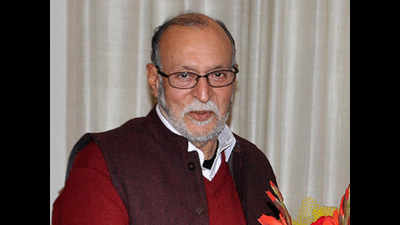- News
- City News
- delhi News
- RWAs write to Delhi lieutenant governor for audit in all sectors
Trending
This story is from July 2, 2020
RWAs write to Delhi lieutenant governor for audit in all sectors
Highlighting the lapses by civic agencies in implementing structural safety norms, a united body of resident welfare associations has written to the lieutenant governor on Tuesday, demanding execution of norms in all sectors simultaneously rather than taking commercial or institutional buildings on priority.

Delhi lieutenant governor Anil Baijal
NEW DELHI: Highlighting the lapses by civic agencies in implementing structural safety norms, a united body of resident welfare associations has written to the lieutenant governor on Tuesday, demanding execution of norms in all sectors simultaneously rather than taking commercial or institutional buildings on priority.
On the direction of Delhi high court, the three municipal corporations have recently issued notices to 258 schools, residential group housing societies, institutional buildings etc.to submit structural audit reports to ensure seismic stability of the buildings in 30 days. The civic agencies plan to cover the entire city in six months.
North Delhi Municipal Corporation, which has issued notices to 115 schools and societies, said in a press statement that “structural safety audit and retrofitting of high-risk buildings in government or private sector will be done in phase I and completed within three years. In the second phase, buildings coming under the lower risk matrix as well as those falling in the jurisdiction of unauthorised, regularised (earlier unauthorised), village abadis, re-settlement colonies and special areas will be taken up.”
However, members of United Residents Joint Action (URJA) argued that Delhi’s more than 60% population live in unauthorised, regularised colonies, JJ clusters, slums and even old neighborhood areas like Chandni Chowk, Sadar Bazar, Shahdara, Nazafgarh, Mehrauli. “Many unauthorised, regularised colonies fall in high risk category and are prone to get affected during earthquakes. Most of the structures which do not comply with the structural safety norms will get demolished by quakes, causing huge loss of life,” said Atul Goyal, president of URJA.
On the direction of Delhi high court, the three municipal corporations have recently issued notices to 258 schools, residential group housing societies, institutional buildings etc.to submit structural audit reports to ensure seismic stability of the buildings in 30 days. The civic agencies plan to cover the entire city in six months.
North Delhi Municipal Corporation, which has issued notices to 115 schools and societies, said in a press statement that “structural safety audit and retrofitting of high-risk buildings in government or private sector will be done in phase I and completed within three years. In the second phase, buildings coming under the lower risk matrix as well as those falling in the jurisdiction of unauthorised, regularised (earlier unauthorised), village abadis, re-settlement colonies and special areas will be taken up.”
However, members of United Residents Joint Action (URJA) argued that Delhi’s more than 60% population live in unauthorised, regularised colonies, JJ clusters, slums and even old neighborhood areas like Chandni Chowk, Sadar Bazar, Shahdara, Nazafgarh, Mehrauli. “Many unauthorised, regularised colonies fall in high risk category and are prone to get affected during earthquakes. Most of the structures which do not comply with the structural safety norms will get demolished by quakes, causing huge loss of life,” said Atul Goyal, president of URJA.
Meanwhile, an official of the South Delhi Municipal Corporation explained the reason for selecting government or private buildings. “These are isolated buildings constructed on large areas so chances of their crashing down is higher. In comparison, houses — even in unauthorised or regularised or approved colonies — are constructed next to each other and have low chances. Moreover, safety certificate is required only for buildings constructed before 2001, because after that the seismic norms were incorporated in Delhi’s building bylaws,” the official said.
End of Article
FOLLOW US ON SOCIAL MEDIA










